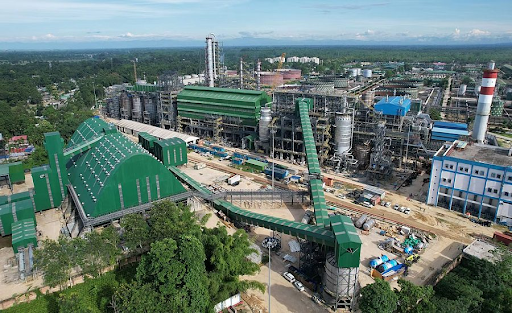



India’s first bamboo-based biorefinery in Numaligarh, Assam, aiming to convert abundant bamboo resources into bioethanol and green chemicals annually. This initiative will boost India's Ethanol Blending Programme and Net Zero by 2070 targets, promoting energy security and a sustainable circular economy.

Copyright infringement not intended
Picture Courtesy: INDIANMASTERMINDS
India's first bamboo-based biorefinery has been completed in Numaligarh, Assam, to produce bio-ethanol and other value-added chemicals from locally sourced bamboo.
The Numaligarh biorefinery, developed by Assam Bio Ethanol Private Limited (ABEPL) uses bamboo to produce bioethanol and green chemicals.
Technology: Utilizes Chempolis’ fractionation technology, processing bamboo into cellulose, hemicellulose, and lignin to produce ethanol, furfural, acetic acid, and biocoal for 25 MW power generation.
Production Capacity: Processes 500,000 tonnes of bamboo annually to produce 49,000 tonnes per annum (TPA) bioethanol.
Zero-Waste Design: Converts bamboo residue into biochar and power, ensuring no waste and carbon-negative operations.
Advance Ethanol Blending: Support India’s target of 20% ethanol blending in petrol by 2025, reducing fossil fuel reliance.
Promote Green Chemicals: Produce value-added chemicals like acetic acid and furfural for industrial applications.
Boost Rural Economy: Create a bamboo supply chain, increase farmers income and generate jobs across Assam.
Achieve Sustainability: Contribute to Net Zero emissions by 2070 through carbon-negative operations and renewable feedstock.
Enhance Self-Reliance: Reduce crude oil imports, saving foreign exchange reserves.
Boosts Circular Economy: Produces high-value chemicals like furfural (used in pharmaceuticals) and acetic acid (used in agriculture), diversifying revenue streams.
Empowers Northeast: Revives bamboo markets, creating infrastructure, empowering farmers and generating jobs.
Global Leadership: Positions India as a pioneer in 2G ethanol technology, setting a model for bamboo-rich nations.
Drives Atmanirbhar Bharat: Promotes indigenous technology and local resources, aligning with Make in India and reducing reliance on foreign fuel and chemicals.
|
Steps taken by Government for Bamboo Economy National Bamboo Mission (NBM): Focuses on developing the entire bamboo value chain, including cultivation, processing, and marketing, with a focus on non-forest lands. Decriminalized bamboo: An amendment to the Indian Forest Act in 2017 exempted bamboo grown on private land from being legally considered a "tree," easing cultivation and transport. Market access: A dedicated "Bamboo Window" on the Government e-Marketplace (GeM) connects producers with buyers. GST reduction: Taxes on bamboo furniture and flooring were reduced to 12% to boost affordability and demand. Agarbatti sector support: Import duties were increased on round bamboo sticks to promote domestic production and reduce reliance on imports. |
Feedstock Supply: Ensuring consistent bamboo supply faces challenges due to geographical distribution and variability in bamboo quality.
High Capital Costs: The ₹7,200 crore investment poses financial risks, with long payback periods for 2G biorefineries.
Technological Gap: 2G ethanol technology requires further optimization for large-scale multi-product production.
Regulatory Hurdles: Complex permitting processes and varying state regulations for bamboo delay scaling.
Market Risks: Price volatility of bio-based products and competition with fossil-based alternatives threaten commercial viability.
Strengthen Supply Chain: Develop decentralized bamboo aggregation centers and promote tissue-cultured saplings for higher yields.
Enhance R&D: Invest in optimizing 2G ethanol processes and modular biorefinery designs to improve efficiency and scalability.
Policy Support: Expand Assam’s Integrated Clean Energy Policy (2025) incentives to other states, by offering capital subsidies and single-window clearances.
Engage Stakeholders: Increase awareness among farmers through training programs, leveraging models like International Network for Bamboo and Rattan (INBAR) initiatives in Africa for bamboo bioenergy.
Innovative Financing: Use public-private partnerships and loan guarantees to reduce financial risks and attract investment for future biorefineries.
India's first bamboo-based biorefinery in Assam supports E20 ethanol blending, reduces import dependence, and stimulates rural development, highlighting the convergence of renewable energy and bioeconomy.
Source: INDIANMASTERMINDS
|
PRACTICE QUESTION Q. The abundance of bamboo in the Northeast region provides a unique opportunity for sustainable industrial development. Critically analyze. 150 words |
It is an industrial facility that uses bamboo biomass to produce biofuels (like ethanol), biochemicals, biomaterials, and clean energy, reducing dependence on fossil fuels.
At Numaligarh, Assam, operated by Assam Bio Refinery Private Limited (ABRPL).
Bamboo is fast-growing, non-food biomass, regenerates naturally, and avoids the food-versus-fuel conflict of crops like sugarcane.






© 2026 iasgyan. All right reserved